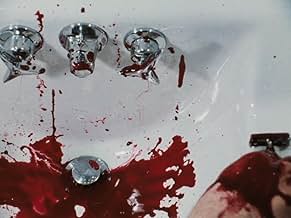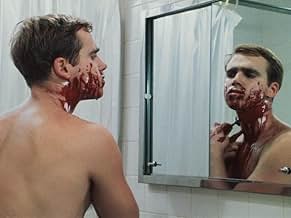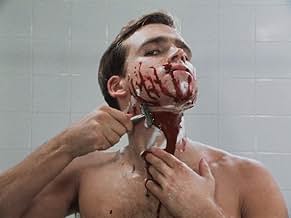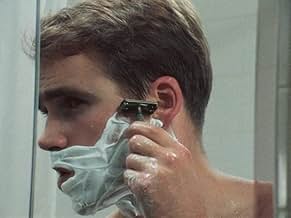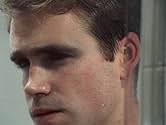IMDb रेटिंग
7.0/10
9.4 हज़ार
आपकी रेटिंग
अपनी भाषा में प्लॉट जोड़ेंIn the process of shaving, a young man cuts himself. A lot.In the process of shaving, a young man cuts himself. A lot.In the process of shaving, a young man cuts himself. A lot.
- निर्देशक
- लेखक
- स्टार
- पुरस्कार
- कुल 1 जीत
फ़ीचर्ड समीक्षाएं
"The Big Shave" is disturbingly bold, brave and of course, bloody... but no one would certainly have remembered it had it not been the first film of director Martin Scorsese.
The various parts of an ordinary bathrooms are shown through a stylish editing and under a smooth and relaxed 30's jazz music that will be the film's only sound. Then a young man enters, nothing special about him, he's young, not bad-looking and still dazed of sleepiness, he puts some shaving foam, takes his razor and so begins the shave. Not so big at first, it goes well and then he puts more foam and repeats the same modus operandi then it goes on... and on, the first drops of blood soils the immaculate white porcelain. The man is tracing horizontal lines of blood all over his cheeks, drops of blood have been replaced by red flooding on the sink and the film climaxes with the man cutting (not slitting) his throat, from ear to ear, making vertical lines of blood on his chest and as he (finally) puts his razor, the images fades to a red screen. And whoever provided that (fake?) blood deserved to be mentioned in the credits.
By the way, the alternate title is given at the end credits and it's Viet '67.
Obviously, it's a metaphor of the Vietnam War but instead of sticking to the obvious (since the director mentions it), I appreciate how the use of jazz music, shockingly casual and relaxed, fits the relative indifference of the exterior eye toward the conflict, especially if jazz reflects the "older" generation. But more disturbing is the man's own indifference. This is a fine man, at the peak of his youth and watching him mutilating himself isn't just horrific because of the graphicness but because it feels like a terrible waste, extremely pointless. In fact, he didn't even look like he needed a shave... and that's the point for the movie whose name's Viet 67. Marty was of the same generation of the youth sacrificed in Nam and this his angst cry.
It's by the way interesting that Marty would also be present in Woodstock as an editor and it's only fitting that he could witness the most iconic artistic expression of that anger because was also destined to become one of the greatest artists of his generation and his legacy immortalized the film. And what a legacy! I won't drop titles right now because I'll use them to make my points.
Now, a few days ago, I was watching "The Irishman" and I observed how desensitized I was to the effect of gunshots, but still, the big picture affected me, it's not the use of violence that shocks but its pointlessness. Indeed, just because there's a cause to violence doesn't make it reasonable for all that... Travis Bickle did use violence to save a young prostitute but let's not forget it was Plan B after failing to assassinate a politician, just because he gave violence a meaning (and even justification) didn't make his motives any nobler. There's always an element of ego and hubris in these characters, something that confines to self-destruction... Hoffa not getting the threats, Tommy De Vito or Nicky Santoro escalating in violence, La Motta getting increasingly jealous and taking all the hits against Sugar Ray Robinson, it all started with that man that keeps shaving as if blood had no effect whatsoever.
And why do we shave? To look clean or good. It's America's obsession, how do we look in front of the world, it's not an obsession for violence, but a self-obsession that Marty exorcizes because, maybe, he feels concerned by the own thing he denounces. Indeed, the film might betray a sort of hypnotic gaze toward blood, the young sickly director who couldn't become a priest and became famous by portraying sinners, insisting that it's only in the streets that you could find redemption, not in church. It goes back to his deep belief in Jesus Christ and I couldn't help but think of Willem Defoe's relieved smile in "Last Temptation of Christ", when he realizes he's being crucified (renouncing the other path), he doesn't even feel the suffering, he almost savors it.
The Christ's blood has been part of the Catholic symbolism, and behind the condemnation of violence, there's a weird and hypnotic fascination of Marty's eye for blood, not violence but blood... as if Scorsese was intoxicated by the Christ's own blood. This artistic inebriation foreshadows the unique style of a director who didn't make violence cool, but he didn't make it ugly either. Violence by essence can't be boring, Tarantino knows it too, but Scorsese gives violence a meaning that cuts straight to your soul.
And "The Big Shave" is fascinating in the way it contains the core of Scorsese's movies, that mix of fascination and revulsion for violence, echoed in each of his films and rooted in his Catholic upbringing, his New Yorker heart... and his conscience as an American who can't stand watching his country sacrificing its youth. Marty's not a pacifist or a conscience objector but a man who knows too much the cathartic value of violence to see it used in vain... and understanding "The Big Shave" is understanding the roots of his torment and ultimately his genius.
The various parts of an ordinary bathrooms are shown through a stylish editing and under a smooth and relaxed 30's jazz music that will be the film's only sound. Then a young man enters, nothing special about him, he's young, not bad-looking and still dazed of sleepiness, he puts some shaving foam, takes his razor and so begins the shave. Not so big at first, it goes well and then he puts more foam and repeats the same modus operandi then it goes on... and on, the first drops of blood soils the immaculate white porcelain. The man is tracing horizontal lines of blood all over his cheeks, drops of blood have been replaced by red flooding on the sink and the film climaxes with the man cutting (not slitting) his throat, from ear to ear, making vertical lines of blood on his chest and as he (finally) puts his razor, the images fades to a red screen. And whoever provided that (fake?) blood deserved to be mentioned in the credits.
By the way, the alternate title is given at the end credits and it's Viet '67.
Obviously, it's a metaphor of the Vietnam War but instead of sticking to the obvious (since the director mentions it), I appreciate how the use of jazz music, shockingly casual and relaxed, fits the relative indifference of the exterior eye toward the conflict, especially if jazz reflects the "older" generation. But more disturbing is the man's own indifference. This is a fine man, at the peak of his youth and watching him mutilating himself isn't just horrific because of the graphicness but because it feels like a terrible waste, extremely pointless. In fact, he didn't even look like he needed a shave... and that's the point for the movie whose name's Viet 67. Marty was of the same generation of the youth sacrificed in Nam and this his angst cry.
It's by the way interesting that Marty would also be present in Woodstock as an editor and it's only fitting that he could witness the most iconic artistic expression of that anger because was also destined to become one of the greatest artists of his generation and his legacy immortalized the film. And what a legacy! I won't drop titles right now because I'll use them to make my points.
Now, a few days ago, I was watching "The Irishman" and I observed how desensitized I was to the effect of gunshots, but still, the big picture affected me, it's not the use of violence that shocks but its pointlessness. Indeed, just because there's a cause to violence doesn't make it reasonable for all that... Travis Bickle did use violence to save a young prostitute but let's not forget it was Plan B after failing to assassinate a politician, just because he gave violence a meaning (and even justification) didn't make his motives any nobler. There's always an element of ego and hubris in these characters, something that confines to self-destruction... Hoffa not getting the threats, Tommy De Vito or Nicky Santoro escalating in violence, La Motta getting increasingly jealous and taking all the hits against Sugar Ray Robinson, it all started with that man that keeps shaving as if blood had no effect whatsoever.
And why do we shave? To look clean or good. It's America's obsession, how do we look in front of the world, it's not an obsession for violence, but a self-obsession that Marty exorcizes because, maybe, he feels concerned by the own thing he denounces. Indeed, the film might betray a sort of hypnotic gaze toward blood, the young sickly director who couldn't become a priest and became famous by portraying sinners, insisting that it's only in the streets that you could find redemption, not in church. It goes back to his deep belief in Jesus Christ and I couldn't help but think of Willem Defoe's relieved smile in "Last Temptation of Christ", when he realizes he's being crucified (renouncing the other path), he doesn't even feel the suffering, he almost savors it.
The Christ's blood has been part of the Catholic symbolism, and behind the condemnation of violence, there's a weird and hypnotic fascination of Marty's eye for blood, not violence but blood... as if Scorsese was intoxicated by the Christ's own blood. This artistic inebriation foreshadows the unique style of a director who didn't make violence cool, but he didn't make it ugly either. Violence by essence can't be boring, Tarantino knows it too, but Scorsese gives violence a meaning that cuts straight to your soul.
And "The Big Shave" is fascinating in the way it contains the core of Scorsese's movies, that mix of fascination and revulsion for violence, echoed in each of his films and rooted in his Catholic upbringing, his New Yorker heart... and his conscience as an American who can't stand watching his country sacrificing its youth. Marty's not a pacifist or a conscience objector but a man who knows too much the cathartic value of violence to see it used in vain... and understanding "The Big Shave" is understanding the roots of his torment and ultimately his genius.
The ritual of shaving and it's risks is explored by a young Scorsese. Surely every man has felt the fear/temptation of cutting one's self with a razor. A typical outlet for his self-loathing Catholic guilt, the gore is contrapuntally balanced by incongruous music on the soundtrack. Bunny Berigan's "I Can't Get Started" recalls the blackly comic ending to "Dr. Strangelove" with "We'll Meet Again" accompanying images of nuclear holocaust. Strangely, the young man in the feature is not in need of a shave in the slightest. And he shaves a second time in a row, the second time with bloody consequences. As other reviewers have posted, there may be some symbolic significance to this short film. Knowing Scorsese, it undoubtedly operates on many levels. It is to his credit as a filmmaker that he is able to make a solitary, mundane task so attention-grabbing.
Saturday, the 8th of April was one of those days when I didn't have a lot of free time to watch a movie. On days like that, sometimes it's nice to watch a short film because at least it's something, and part of me feels compelled to at least log something every day.
So I picked the first short film that came to mind, which is one of the earliest things Martin Scorsese ever made: a dialogue-free horror film about a guy shaving. He keeps shaving more than he needs to, and things get bloody. That's about it.
It's kind of effective for something so simple? But I wish it had gone a little more extreme than it did (even though it gets pretty gross, I feel like even a young, possibly film student Scorsese could've done a bit more). Some of the editing has the feel of his later films, which was cool. And it gets a bit of an emotional reaction out of me as a viewer, as many of his longer and better films also do.
So I picked the first short film that came to mind, which is one of the earliest things Martin Scorsese ever made: a dialogue-free horror film about a guy shaving. He keeps shaving more than he needs to, and things get bloody. That's about it.
It's kind of effective for something so simple? But I wish it had gone a little more extreme than it did (even though it gets pretty gross, I feel like even a young, possibly film student Scorsese could've done a bit more). Some of the editing has the feel of his later films, which was cool. And it gets a bit of an emotional reaction out of me as a viewer, as many of his longer and better films also do.
Martin Scorsese cooked up this quick little film before he made his debut feature, and here examines a somewhat anti-Vietnam, perfectionists perspective, all enveloped in one man's craze to shave his face over and over again. Mysterious on the first viewing, graphic on repeated ones, but the effect of it being well crafted in its fakeness and surrealism is noticable. Kudos! A+
This is six minutes of introduction to the world of Martin Scorsese. You may anticipate a story but it is only portrait of an obsessive shaver who shaves until he makes a bloodbath out of his face. A gruesome sight to average spectator ,and in one shot even to a more sophisticated one when the man pulls the blade from one end of his neck to another and acts very convincingly, this short film is an unblinking portrait of violence and especially personal violence for that matter, with a strong streak of masochism familiar to the fans of Scorsese. A man shaves or punishes himself for no apparent reason but cleansing(his face or his soul?). Also you can see the making of a director infatuated with the montage who will use its techniques for years to come.
The Big Shave also displays an effective use of two colors in jarring contrast for an aesthetic purpose: white of the bathroom and red of the blood. White and Red devour the character and the viewer and signal the world of a director in love with radical shifts and juxtapositions. overall a student film from Scorsese in retrospect is a lesson in film history. Experiment is the prerequisite of perfection. The jazz song which accompanies the whole film and unites its images has been wonderfully used.
The Big Shave also displays an effective use of two colors in jarring contrast for an aesthetic purpose: white of the bathroom and red of the blood. White and Red devour the character and the viewer and signal the world of a director in love with radical shifts and juxtapositions. overall a student film from Scorsese in retrospect is a lesson in film history. Experiment is the prerequisite of perfection. The jazz song which accompanies the whole film and unites its images has been wonderfully used.
क्या आपको पता है
- ट्रिवियाThis film is included in the "Martin Scorsese Shorts" set, released by the Criterion Collection, spine #1,030.
- क्रेज़ी क्रेडिटWhiteness - Herman Melville
- इसके अलावा अन्य वर्जनSome prints allegedly contain a final title card connecting the film to the Vietnam War, though such prints are no longer in circulation, nor is it on the videocassette version.
- कनेक्शनFeatured in Midnight Underground: The Surreal (1993)
टॉप पसंद
रेटिंग देने के लिए साइन-इन करें और वैयक्तिकृत सुझावों के लिए वॉचलिस्ट करें
विवरण
- रिलीज़ की तारीख़
- कंट्री ऑफ़ ओरिजिन
- आधिकारिक साइट
- भाषा
- इस रूप में भी जाना जाता है
- La gran afaitada
- फ़िल्माने की जगहें
- उत्पादन कंपनियां
- IMDbPro पर और कंपनी क्रेडिट देखें
इस पेज में योगदान दें
किसी बदलाव का सुझाव दें या अनुपलब्ध कॉन्टेंट जोड़ें


